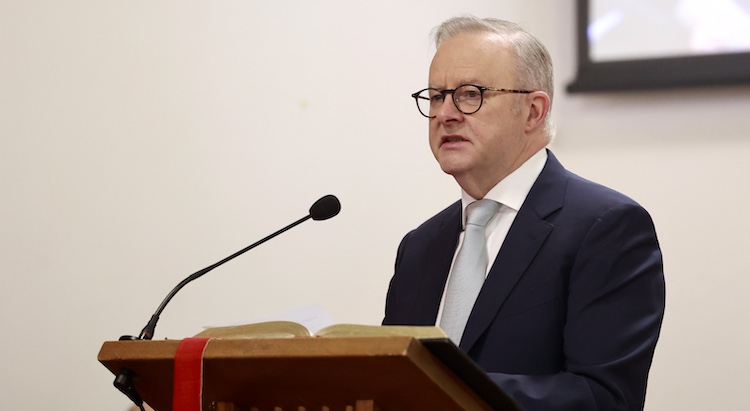Late last night (in DC time, anyway), Australian Prime Minister Anthony Albanese called a rather remarkable press conference. Australia’s domestic intelligence agency, the Australian Security Intelligence Organization, had been digging into a spate of anti-Semitic attacks since Oct. 7, 2023. Albanese announced that the agency “has gathered enough credible intelligence to reach a deeply disturbing conclusion—that the Iranian Government directed at least two of these attacks,” including one on a synagogue in Melbourne.
Albanese continued:
“ASIO assesses it is likely Iran directed further attacks as well. These were extraordinary and dangerous acts of aggression orchestrated by a foreign nation on Australian soil. … A short time ago we informed the Iranian Ambassador to Australia that he would be expelled. We have suspended operations at our embassy in Tehran, and all our diplomats are now safe in a third country. I can also announce the Government will legislate to list Iran’s Islamic Revolutionary Guard Corps, the IRGC, as a terrorist organization.”
It is no secret that Albanese has received much deserved scorn lately for his handling of Australia’s relations with Israel and its role in the current conflict. The premier at first signaled that he would proceed with caution on the matter of whether to recognize a Palestinian state. But he threw that caution to the wind once all his friends started joining that particular club.
The pleas of Australia’s Jews fell on deaf ears. Albanese seemed suddenly unconcerned with anti-Semitism and the government’s responsibility to confront it. Upon Israel’s objections to this indifference, Albanese’s government got prickly. Prime Minister Benjamin Netanyahu denounced Albanese as weak-willed, and Albanese’s home affairs minister shot back that Israel measures strength “by how many people you can blow up.”
The row left Australia’s Jewish community even more on-edge. Yet it clearly left the government looking for a way to prove itself tougher in the face of terror and foreign manipulation. The discovery of Iran’s directing attacks on the Australian homeland was just such a chance. And Albanese didn’t fumble it.
Indeed, moving to outlaw the IRGC is a substantial-enough response. One can argue that it should have already been done, but here we are. As for the diplomatic penalties levied on the Islamic Republic, Foreign Minister Penny Wong, who joined Albanese at the presser, explained that this was “the first time in the post-war period that Australia has expelled an ambassador.”
Might, dare one hope, this stiffened Australian spine influence other Western leaders the way those leaders’ weakness influenced Australia? At the risk of courting disappointment, it’s worth considering what France in particular can learn from this series of events.
France, to recap, is also in a tiff with Israel—and now the United States—over its government’s emboldening of anti-Israel activists. President Emmanuel Macron has been the ringleader of the club of poor decision-makers to which UK leader Keir Starmer and Canadian premier Mark Carney also belong. France has the largest Diaspora Jewish community outside of the U.S. and a robust culture of Jew-baiting, a volatile combination.
The U.S. ambassador to France is Charles Kushner, father of Jared Kushner, President Trump’s son-in-law. Charles Kushner recently felt compelled to address the rampant anti-Semitism and Macron’s lack of constructive action: “Mr. President, I urge you to act decisively: enforce hate-crime laws without exception; ensure the safety of Jewish schools, synagogues and businesses, prosecute offenders to the fullest extent; and abandon steps that give legitimacy to Hamas and its allies.”
The French government was furious, claiming—astonishingly—that Kushner’s comments “violate international law, particularly the duty not to interfere in the internal affairs of states.”
This ridiculous French tantrum is not only childish but hypocritical. Does France not meddle near-daily in Israel’s affairs? And what about its own ambassadors’ outspokenness? On election night in 2016, after Trump’s emerging victory became clear, French Ambassador to the U.S. Gerard Araud tweeted: “It is the end of an era, the era of neoliberalism. We don’t yet know what will succeed it … After Brexit and this election, anything is possible. A world is collapsing before our eyes. Vertigo.”
Vertigo! A world collapsing! Oh the drama. Before his retirement, Araud even gave an interview to the Guardian in which he spat a series of insults at the U.S. president and his policies.
In fairness, Araud’s tweet was easy to miss; not only did he delete it soon after, but he famously blocked half the world on Twitter. Araud was both pompous and thin-skinned, aloof and temperamental all at once. But I don’t believe any of this violated international law.
In any event, Kushner is right and Macron is wrong. Rather than snapping at Jews, Macron might consider following Albanese’s example and actually take formal action to protect French Jews. And perhaps Israel’s staunch defense of Jews the world over shouldn’t be so easily dismissed.













![(L) U.S. President Donald Trump reacts as he meets British Prime Minister Keir Starmer [not pictured] for bilateral talks at Trump Turnberry golf club on July 28, 2025 in Turnberry, Scotland. (R) James Boasberg, chief judge of the US District Court for the District of Columbia, attends a panel discussion at the annual American Board Association (ABA) Spring Antitrust Meeting at the Marriott Marquis in Washington, DC, on April 2, 2025.](https://www.constitutionpatriots.com/wp-content/uploads/2025/07/Fed-up-Trump-Admin-Begins-Official-Process-to-Stop-Power-Mad-350x250.jpg)


